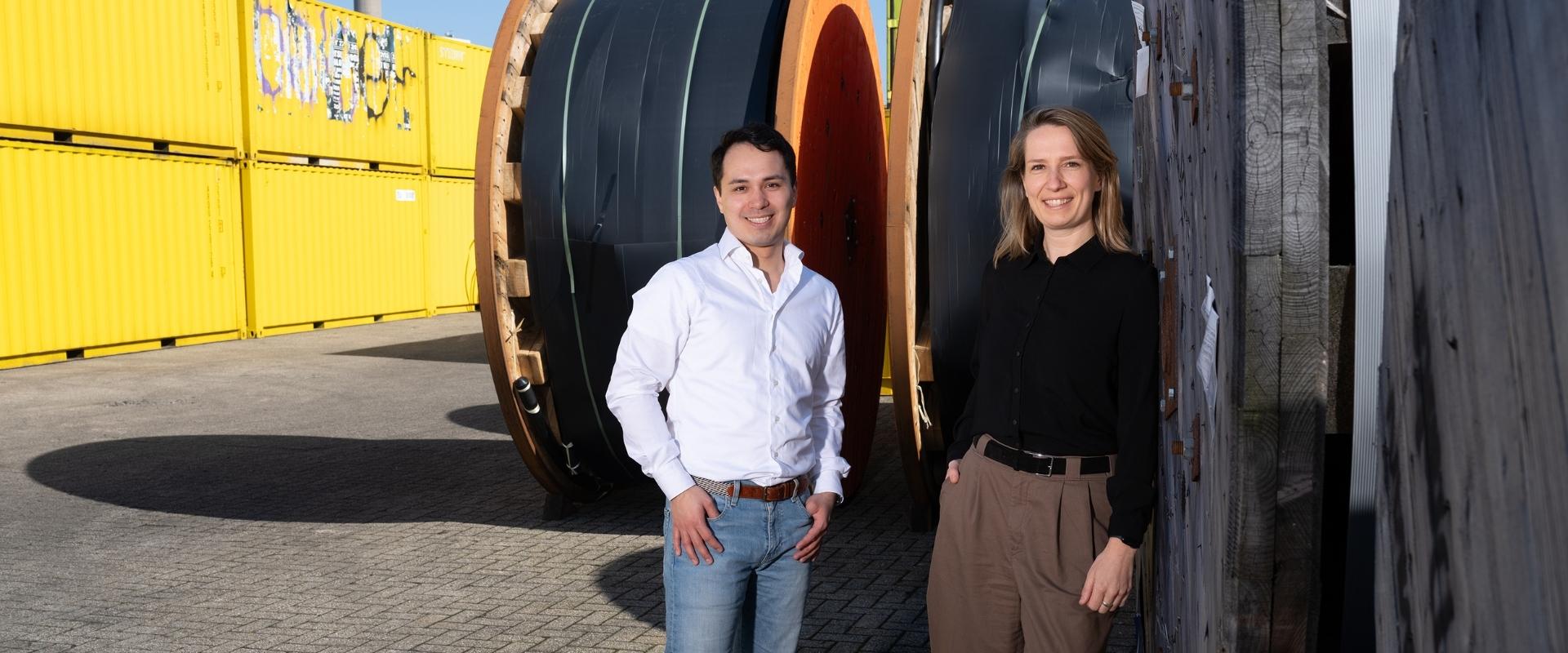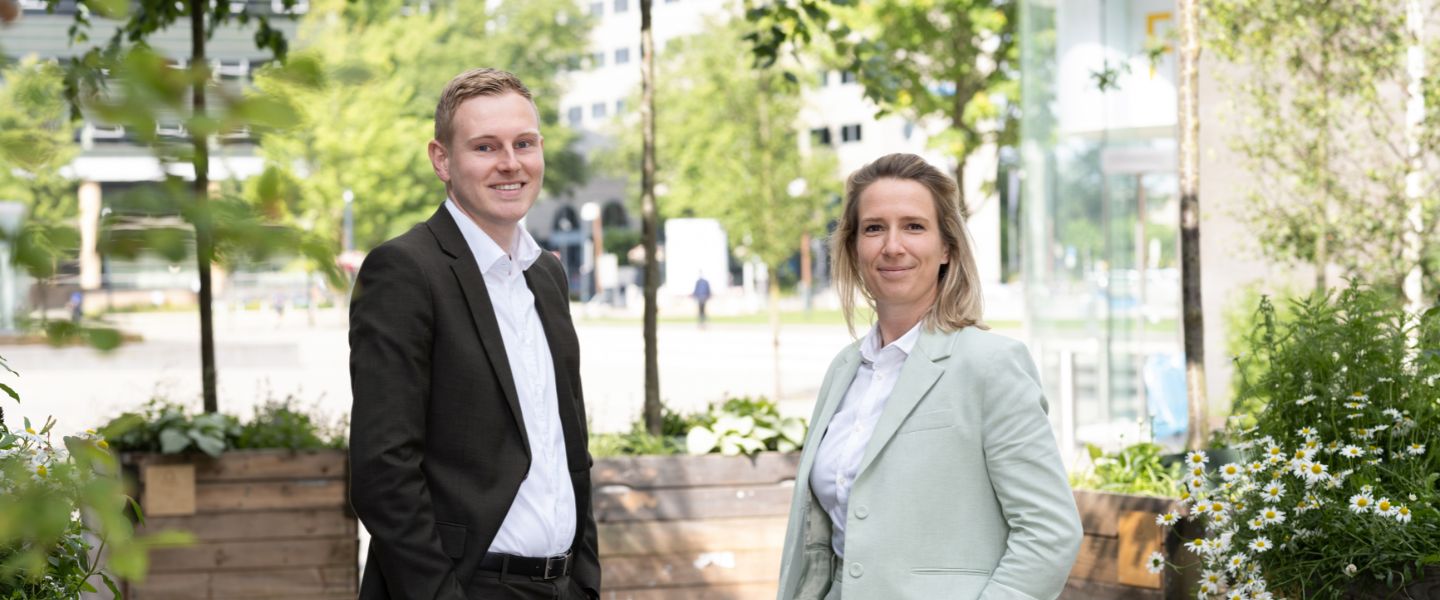Sustainable momentum

Sustainability is under pressure worldwide. Political unrest, economic uncertainty, and social division are causing organisations to hesitate: push forward or scale back? Yet Grant Thornton’s latest International Business Report (IBR) paints a different picture. Between April and June 2025, more than 15,000 entrepreneurs and executives from mid-market companies (50–500 employees and annual revenues of €10–500 million) across 35 markets worldwide were surveyed on the topic of sustainability.
The global mid-market isn’t holding back. It’s moving forward. These businesses don’t see sustainability as a box to tick, but as a strategic path toward growth, profitability, and international expansion. In this article, you’ll discover how they’re embedding sustainability into their operations, including how they report, invest, and innovate, as well as how they navigate changing regulations and turn barriers into opportunities.
Sustainability as a growth path

At the start of 2025, it became clear that sustainability legislation was under pressure. Geopolitical tensions, economic uncertainty, and energy challenges led to a resurgence of economic nationalism, a renewed preference for fossil fuels, and the rollback of green regulations. Only 17 per cent of the UN’s Sustainable Development Goals were on track.
Even so, our research shows that globally, 85.9 per cent of mid-market businesses plan to maintain or increase their investments in sustainability. In the Netherlands, the picture looks different: only 43.3 per cent of companies expect to increase their spending on sustainable initiatives, which is roughly in line with the European average.
The main drivers for investing in sustainability are competitive pressure and reputation. Both were mentioned by more companies than last year (41.6% vs. 31.3% and 38.0% vs. 31.9%, respectively), showing a sharper focus on how sustainability helps win customers and stay ahead of competitors.
One of the primary reasons many mid-market companies invest in sustainability initiatives is that they recognise a clear connection between sustainability and long-term financial returns. More than half (54 per cent) of respondents worldwide believe sustainability will, in time, increase profitability, and 51.3 per cent expect it will raise revenue. In the Netherlands, views are a little more cautious: 35.8 per cent believe sustainability will eventually improve profitability, while 41.8 per cent expect it will boost revenue in the long run.
Recent developments in Europe, where many sustainability regulations are under pressure, have created an uncertain outlook for businesses and that uncertainty may influence their outlook. Still, a share of entrepreneurs and executives worldwide do not believe that sustainability contributes to achieving commercial goals.
What’s striking is that commercial motives carry more weight than regulation. Companies are driven mainly by opportunity, not obligation.
Where are companies investing?
Among Dutch organisations that said in the second quarter of 2025 they plan to keep their sustainability investments steady (37.3 per cent) or increase them (43.4 per cent), the following areas are where they continue to focus their efforts:
| CO2-reduction | CO2-offsetting | Waste processing and reduction | Social impact (outside the own organisation) | Diversity and inclusion | Biodiversity | Renewable energy | Recycled content | Sustainability reporting | Clean water | Sustainabel procurement/ supply chain transformation | Sustainability goals and KPIs | Digitalisation for efficiency | Development of sustainable products | Other | |
|---|---|---|---|---|---|---|---|---|---|---|---|---|---|---|---|
|
Netherlands
|
22,4%
|
22,4%
|
29,9%
|
17,9%
|
28,4%
|
19,4%
|
22,4%
|
23,9%
|
20,9%
|
20,9%
|
26,9%
|
19,4%
|
22,4%
|
14,9%
|
0,0%
|
|
European Union
|
26,7%
|
23,2%
|
25,5%
|
21,1%
|
24,2%
|
15,6%
|
43,3%
|
26,9%
|
21,8%
|
19,2%
|
22,0%
|
23,1%
|
29,9%
|
26,0%
|
0,1%
|
|
Worldwide
|
28,2%
|
22,3%
|
35,2%
|
28,3%
|
36,0%
|
22,9%
|
43,5%
|
29,5%
|
30,0%
|
22,3%
|
33,7%
|
28,9%
|
34,3%
|
36,1%
|
0,1%
|
Globally, renewable energy tops the list at 43.5 per cent. This is likely because renewable energy and CO₂ reduction are often among the easiest and most cost-effective ways to make a company more sustainable. Depending on the country, greener energy sources can also offer fiscal or regulatory advantages. In the Netherlands, respondents said they focus most on waste processing and reduction, diversity and inclusion, and sustainable procurement or supply chain transformation.
Keeping cool in a heated world
At the start of this year, the regulatory landscape didn’t look promising for the sustainability agenda, given the changes to the Corporate Sustainability Reporting Directive (CSRD) and the rollback of climate reporting requirements by the U.S. Securities and Exchange Commission (SEC). You might expect companies to scale back their sustainability reporting, but that’s not the case for the mid-market.
A clear majority of mid-market businesses worldwide (72.9 per cent) say they plan to continue sustainability reporting. Nearly half (44.8 per cent) see it as ‘good business practice’, while over a third (35.9 per cent) say it aligns with their company's purpose. Sustainability, then, isn’t a side issue; it’s built into the way they operate.

How do companies respond to changing regulations?
- Globally, only 5.5% have stopped reporting entirely. In the Netherlands, that number is even lower at 2.4%.
- Worldwide, 8.0% are taking a wait-and-see approach. In the Netherlands, 9.6% of organisations have paused reporting while adopting this cautious stance.
- Globally, 43.6% continue to report actively. In the Netherlands, this rises to 53%.
- Worldwide, 21.9% say political changes have had no impact. In the Netherlands, that figure is higher at 37.3%.
This is striking. The anticipated disruption from political and regulatory changes appears to be limited.
Regional differences
- European companies are slightly more likely to temporarily pause reporting (12.9% vs. 8% globally), which makes sense given the CSRD changes.
- North American companies continue reporting because they are nearly finished with the process (18.3% vs. 14.1% globally).
Sector differences
- Financial services firms stop or pause reporting more often (18.3% vs. 13.4%), possibly due to rolled-back rules like those from the SEC.
- Healthcare, energy, and the public sector see reporting as aligned with their mission.
Fewer obligations, more control
Research shows that companies don’t ignore political shifts; instead, they embrace the commercial opportunities. Around 34.5% of mid-market companies say that the easing of regulations, such as the narrowed scope of the CSRD, better fits their needs. And 33.1% feel relieved by the proposed changes.
According to our experts, this is because earlier sustainability rules often tried to do too much at once, which tended to hinder rather than encourage companies.
Growth in new markets
A commercial goal or strategy supported by the new regulatory landscape is market expansion. For organisations looking to grow internationally, meeting the requirements of multiple jurisdictions remains essential. Globally, nearly two in five companies (43.1 per cent) say sustainability helps improve export opportunities. The Dutch mid-market is slightly less optimistic, at 34.3%.
This growth objective is further supported by the recent easing of reporting obligations: international markets, particularly in Europe, are now more accessible. Companies can allocate more resources to other aspects of their market strategy, such as marketing and operations, by reducing their compliance costs. It’s important to note, however, that during this research, U.S. import tariffs had not yet been introduced.
Credibility in sustainability, built through transparent reporting, is also a powerful tool for strengthening a brand's reputation in new markets. Our research shows that 49.8 per cent of organisations worldwide believe sustainability enables international expansion (versus 41.8 per cent in the Netherlands). Companies planning to expand their markets cite ‘brand reputation’ more often than average as a key reason for investing in sustainability.
Companies and consumers alike prefer to work with brands that ‘do good’. For newcomers, demonstrable sustainability is a crucial asset for entering new markets.
Globally, mid-sized companies increasingly see sustainability as a lever for operational improvement. When asked which goals are easier to achieve through greater sustainability efforts, improving the supply chain was mentioned most often (53.8%). Companies in banking (64.9%), private equity (64.7%), and technology (65.5%) are particularly optimistic about the impact of sustainability on their supply chains. Not surprisingly, these sectors operate on a global scale. Tech companies have components produced and shipped from multiple countries, while banks and investors rely on international capital networks. In the Netherlands, attracting talent is viewed as the primary operational goal, supported by sustainability.
These examples from highly globalised sectors illustrate how sustainability enables growth and expansion for all mid-sized companies. Meeting international sustainability standards and building a credible, sustainable brand are now essential prerequisites for gaining market access, securing partnerships, and attracting investors and customers.
What now?

The prominent role of the mid-market in the sustainability movement requires a clear understanding of the obstacles companies face when investing and how they can overcome them.
What’s holding companies back?
The most significant barrier for entrepreneurs and executives worldwide is cost: 40.9 per cent cite this as a brake on progress. Next come regulatory complexity (35.0 per cent) and the resources needed to comply with those regulations (32.3 per cent). For Dutch mid-market companies, the main barriers to sustainability are the volume of regulations (14.5 per cent), regulatory complexity (12 per cent), and the required time and personnel (10.8 per cent). Other challenges mentioned include capital investment, lack of internal expertise, supply chain visibility, political uncertainty, and greenwashing.
The challenges are universal, but they vary by region, which means that support needs to be tailored accordingly.
- Europe: Regulatory complexity is cited most often, particularly CSRD obligations. With recent rule changes, companies are likely to focus on implementing streamlined, efficient processes that make compliance easier. As discussed above, changes in European reporting requirements provide organisations with the opportunity to structure their reporting and compliance measures in a way that suits their own operations.
- South America: Cost management is seen as the biggest obstacle. A focus on cost-effective strategies is crucial, including taking advantage of tax incentives and other government measures designed to encourage sustainable investments.
- Africa: Companies doubt political support for sustainability, which hinders investment. Here, it’s important to emphasise the commercial benefits of sustainability, which should be seen as an opportunity, not an obligation.
- Asia-Pacific: Lack of internal expertise is cited more often as a barrier, likely because regulations in many countries (except Australia) are less developed. External experts can help, but sometimes it’s mainly about having the leadership to take initiative.
- North America: The federal system means local and national rules overlap. Here too, there is a need for innovative, streamlined processes.
The Dutch mid-market: pragmatic, future-focused, and commercially driven
The Dutch mid-market stands out for its pragmatic and forward-looking approach to sustainability. While in many countries, regulation or external pressure is the primary driver, Dutch companies see sustainability primarily as a strategic tool for growth, risk management, competitive advantage, and reputation. This translates into an approach that goes beyond mere compliance, focusing on leveraging commercial opportunities and strengthening their market position.
Investments remain steady and widely supported
Forty-three per cent of Dutch companies expect to increase their sustainability investments in 2025. Investment focus is broad, ranging from CO₂ reduction and waste management to diversity & inclusion and supply chain optimisation. Notably, these investments are not just reactive; they are proactively deployed to make the organisation future-ready.

Commercial and operational goals at the centre
In the Netherlands, sustainability is mainly used to achieve commercial objectives. Around 42 per cent cite international expansion as a direct benefit, 39 per cent see supply chain improvement as the key operational gain, and 36 per cent expect long-term profitability to rise. Attracting talent (48 per cent) and investors (34 per cent) also becomes easier with a sustainable approach. This indicates that in the Netherlands, sustainability is not separate from the core of entrepreneurship, but rather seen as a lever for growth, innovation, and workforce appeal.
Barriers are mostly practical and solvable
The main challenges are regulatory complexity (12 per cent), cost (15 per cent), and required resources (11 per cent). Remarkably, lack of support or belief plays little role. Dutch companies are accustomed to navigating changing regulations and mainly seek practical solutions to implement sustainability efficiently and effectively.
Sustainability is embedded in operations
Most companies have been investing in sustainability for several years; only 2 per cent started in the past year. This suggests a mature sustainability policy that isn’t dependent on trends or shifting political winds. 37 per cent remain committed to sustainability regardless of political or regulatory uncertainty, and 29 per cent continue to report voluntarily. Sustainability is not a temporary project but a structural part of business strategy.
Conclusion: Sustainability as a growth accelerator and reputation builder
The Dutch mid-market deliberately embraces sustainability as both a growth driver and a reputation builder. This is not because they have to, but because it works. In the Netherlands, sustainability is therefore not just a compliance issue, but an integral part of business strategy. Companies that successfully link sustainability to their commercial and operational goals not only create societal impact but also strengthen their competitive position and long-term resilience.
Recommendations
The mid-market is becoming a powerful engine for a sustainable global economy. To strengthen this movement, we recommend five actions:
- Make your voice heard
The role of the mid-market in building a sustainable economy needs recognition. Large companies have their own platforms, while small companies are often represented through trade associations; however, the mid-market lacks a strong voice. It’s vital for mid-sized companies to actively participate in discussions with policymakers and regulators, through consultations, committees, or partnerships. - Base decisions on facts
Political and regulatory changes are proving less disruptive than expected. Reporting remains a valuable tool for measuring and demonstrating progress. For companies seeking insight into recent changes, consulting an advisor is recommended. They can help gather the correct data and optimise your sustainability reporting. - Focus on what matters
The easing of regulations creates space to focus on what’s truly relevant for your organisation. Use this opportunity to streamline and enhance your reporting. Less complexity also means more room for growth and international expansion. - Collaborate
While barriers differ by region, cost and complexity are common challenges. Collaboration is key:- Involve investors in your sustainability strategy and resource planning.
- Work with peers in your sector to share costs, for example, by standardising EV charging infrastructure.
- Engage with customers on joint sustainability initiatives, such as eco-friendly delivery options.
- Be clear
The mid-market can help redefine the global sustainability debate, not as an obstacle, but as a catalyst for growth. Stakeholders worldwide need language that resonates. Think in terms of resilience, long-term value, and future-readiness, rather than just climate change.
As political leaders and regulators seek ways to combine economic growth with sustainability goals, the mid-market provides part of the solution. However, its efforts need recognition, support, and leverage.
Through engagement, collaboration, and open dialogue, the mid-market can continue its sustainability journey. Success today means that future generations will reap the benefits of growth and sustainability.
Want to explore how to realise the commercial value of sustainability for your organisation? Contact us.
Our specialists



Related articles
View more










